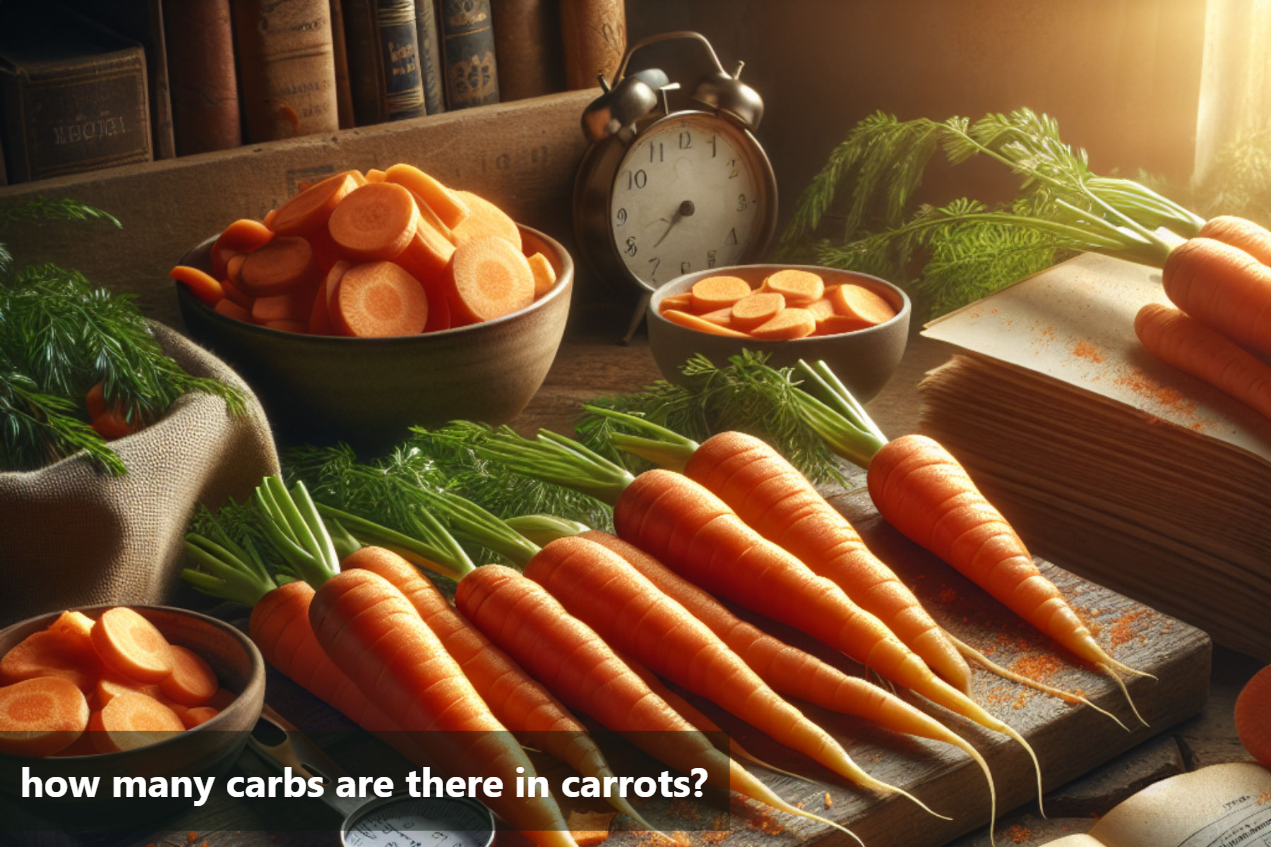
How many carbs are there in carrots?
Carrots, commonly known for their vibrant colour and crunchy texture, are a popular vegetable that contains a moderate amount of carbohydrates. The carbs in carrots primarily come from natural sugars and dietary fibre, making them a nutritious choice for those conscious of their carb intake.
For individuals keeping track of their carbohydrate consumption, knowing the carb content in carrots is helpful. Carrots are considered a low to moderate carb vegetable, with around 6 grams of carbs per 1 medium-sized carrot. This makes them a versatile option for incorporating into various dishes without significantly impacting blood sugar levels.

Healthy Eating: Nutritional profile of carrots
One medium (61-gram) raw carrot provides:
Calories |
25 |
Protein |
1 gram |
Fat |
0 grams |
Carbs |
6 grams |
Fibre |
2 grams |
4 grams |
Carrot Carbs Demystified
Carrots are well-known for being a versatile and nutritious vegetable that can be enjoyed in various ways.
When it comes to their carb content, carrots are relatively low in carbohydrates, making them a great choice for those monitoring their carb intake. In a typical serving of carrots, which is about 1 medium carrot (61 grams), there are approximately 6 grams of carbohydrates.
If you are counting carbs, it's essential to consider the serving size of carrots you consume. A smaller carrot (15 grams) contains around 1.5 grams of carbohydrates, while a larger carrot (72 grams) may have up to 7 grams of carbs.
Despite their natural sugar content, the fibre in carrots helps slow down the release of sugar into the bloodstream, preventing sharp spikes in blood sugar levels.
Including carrots in your meals can provide you with essential nutrients like beta carotene, fibre, and vitamin K while also contributing to your daily carb intake.
-
Whether enjoyed raw as a snack, roasted with herbs, or added to soups and stews, carrots are a delicious and healthy addition to any diet.
Dive into Diversity: The Health Benefits of Various Carrots
Carrot Type
Benefits
Orange Carrots
Rich in beta-carotene, essential for eye health.
Boosts the immune system and supports skin health.
Excellent source of vitamin A.
Purple Carrots
High in antioxidants, particularly anthocyanins.
May help reduce inflammation and lower the risk of chronic diseases.
Unique colour adds variety to meals.
Yellow Carrots
Provide a good dose of lutein, promoting eye health.
Support immune function with their vitamin C content.
Bring a vibrant colour to your plate.
Red Carrots
Packed with lycopene, offering potential heart health benefits.
May have anti-cancer properties.
Adds a pop of colour and variety to dishes.
White Carrots
Lower in calories and rich in fibre, aiding digestion.
Contain beneficial compounds like quercetin.
Mild flavour complements various dishes.
Black Carrots
High in anthocyanins, providing antioxidant benefits.
Potential anti-inflammatory properties.
Unique colour adds intrigue to culinary creations.
Green Carrots
Provide chlorophyll, known for detoxifying properties.
Rich in vitamins and minerals, supporting overall health.
Adds a fresh and earthy flavour to dishes.
Rainbow Carrot Mix
Combines the benefits of various colours in one package.
Offers a diverse range of nutrients and antioxidants.
Enhances visual appeal and encourages a colourful diet.
Heritage Carrot Varieties (e.g., Danvers, Chantenay)
Often have a sweeter and more robust flavour.
Maintain historical traits and unique characteristics.
Can be a flavourful addition to both raw and cooked dishes.
Baby Carrots
Convenient and easy to snack on.
Retain the nutritional benefits of full-sized carrots.
Ideal for portion control and lunchbox snacks.

Carrot Carb Count: How Many Carbs Are in Carrots
Carrots are not only delicious but also packed with essential nutrients that can benefit your overall health. When it comes to the carb content of carrots, they are relatively low in carbs, making them a great addition to a balanced diet. In a single medium-sized carrot, you can expect to find around 6 grams of carbs, mainly in the form of simple sugars and fibre.
To include carrots in your meals, you can enjoy them raw as a snack, add them to salads for a crunchy texture, or include them in soups and stews for added colour and flavour. Additionally, you can roast carrots with herbs and spices for a flavourful side dish that complements any main course.
The carb content of carrots makes them a versatile and nutritious ingredient to incorporate into your diet. Whether you're looking to boost your vitamin intake or add more fibre to your meals, carrots are a colourful and tasty option that can enhance your overall well-being.
FAQs
-
How many carbs are there in raw carrots?
A single raw carrot contains about 6 grams of carbs.
-
What about cooked carrots, how many carbs do they have?
One cup of cooked carrots has around 12 grams of carbs.
-
Are baby carrots a low-carb option?
Yes, a serving of baby carrots typically has 5 grams of carbs.
-
Can carrots be included in a low-carb diet?
Yes, carrots are a good choice for a low-carb diet, as they are relatively low in carbs compared to many other vegetables.
This Blog post is an initiative by Lo! Foods, to provide accurate and Nutritionist / Doctor approved information related to Health. Lo! Foods is India's leading brand for Everyday Functional Foods. Foods designed for specific Health conditions or Needs. Lo! Foods also runs India's largest range of Low Carb Healthy Cloud Kitchens, under the brand names of Lo!, ProteinChef, ATH (All Things Healthy) and DiabeSmart.















Leave a comment
Your email address will not be published.